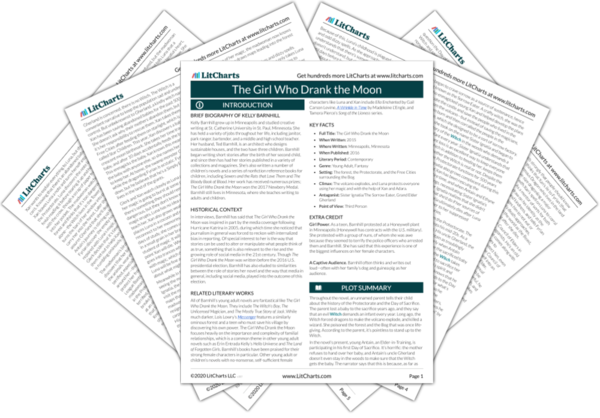According to the Elders who rule the Protectorate, there is a Witch who terrorizes the forest and demands a baby as a sacrifice every year. This fictional Witch—as opposed to any of the actual witches in the novel—symbolizes storytelling’s power to control people, as the specific Witch that the Elders talk about does exist. Instead, she’s nothing more than a story designed to keep the populace terrified, sorrowful, and under control of the Protectorate’s powerful elite. At several points throughout the novel, the reader discovers that there are real witches around. One of them, Xan, who lives in the forest and takes the abandoned babies in order to protect them (rather than harm them), is kind and certainly doesn’t demand the sacrifice; while Sister Ignatia, the Head Sister of the Order of the Star, is more akin to the Witch in the stories. In this way, the various versions of the Witch speak more broadly to the fact that stories can be slippery and easy to manipulate. Anyone, the novel suggests, can be the Witch if the storyteller makes their case in the right way.
The Witch Quotes in The Girl Who Drank the Moon
They left knowing that there surely wasn’t a witch. There never had been a witch. There were only a dangerous forest and a single road and a thin grip on a life that the Elders had enjoyed for generations. The Witch—that is, the belief in her—made for a frightened people, a subdued people, a compliant people, who lived their lives in a saddened haze, the clouds of their grief numbing their senses and dampening their minds. It was terribly convenient for the Elders’ unencumbered rule.
But he didn’t kill the Witch. The Witch killed him instead.
This is why it doesn’t pay to be brave. Bravery makes nothing, protects nothing, results in nothing. It only makes you dead. And this is why we don’t stand up to the Witch. Because even a powerful old wizard was no match for her.
What if we are wrong about the Witch? What if we are wrong about the sacrifice? Antain wondered. The question itself was revolutionary. And astonishing. What would happen if we tried?
Why had the thought never occurred to him before?
They say she even stole it from the moon. And then she cast a spell over all of us—a great cloud of sorrow, covering the world.
Well, of course it covers the world. That’s why the world is drab and gray. That’s why hope is only for the smallest of children. Best you learn that now.
But the volcano never really went out. The wizard stopped it up, but it went underground. And it leaks its fury into the water pools and the mud vats and the noxious vents. It poisons the Bog. It contaminates the water. It is the reason why our children go hungry and our grandmothers wither and our crops are so often doomed to fail. It is the reason we cannot ever leave this place and there is no use trying.
Antain kneeled down. “I’m sorry,” he breathed. “I’m so, so sorry.” He scooped up the bird in his hands. It didn’t look healthy. How could it, in these cursed woods? Half the water was poisoned. The Witch. It all came back to the Witch. Curse her name forever.
A story can tell the truth, she knew, but a story can also lie. Stories can bend and twist and obfuscate. Controlling stories is power indeed. And who would benefit most from such a power? And over time, Ethyne’s eye drifted less and less toward the forest, and more toward the Tower casting its shadow over the Protectorate.
But as the clouds broke and the sky began to clear, they found themselves feeling something else, too. Something they had never felt before.
Here is the baby holding her own sweet baby. My grandchild. Here is her knowing that no one will ever take that child away.
Hope. They felt hope.
Here is the baby in his circle of friends. He is laughing. He loves his life.
Joy. They felt joy.
“How do you know that name?” Sister Ignatia whispered.
“Everyone knows that name,” the madwoman said. “It was in a story. About how the Witch ate a tiger’s heart. They all whisper it. It’s wrong, of course. You don’t have a tiger’s heart. You have no heart at all.”
“There is no such story,” Sister Ignatia said. [...] “I started the stories in the Protectorate. I did. They all came from me. There is no story that I did not tell first.”












